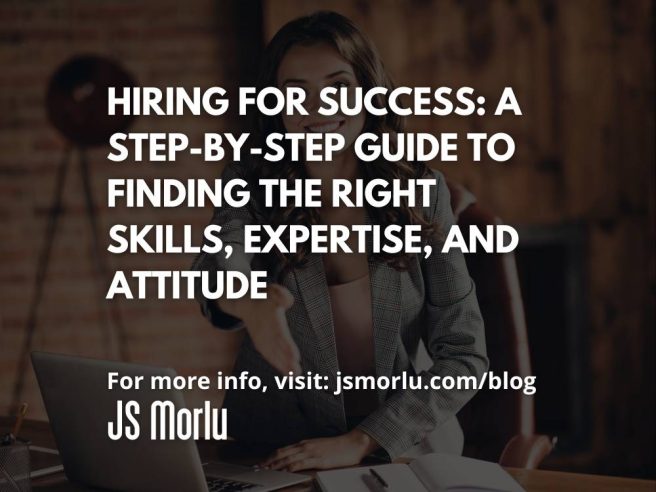By: John S. Morlu II, CPA
Hiring the right people is crucial for any business, but for small businesses, it can be the difference between success and failure. Each employee in a small business typically wears multiple hats and plays a significant role in the overall operations, making it imperative to hire individuals who not only have the right skills and expertise but also the right attitude. The process of hiring for these three qualities—skills, expertise, and attitude—requires a strategic approach. In this guide, we’ll walk you through practical steps and examples to help you attract, evaluate, and secure top talent that aligns with your business goals.

Step 1: Define the Role Clearly
The foundation of a successful hire starts with a clear understanding of the role you need to fill. This involves more than just listing job duties; it requires a deep dive into what specific skills, expertise, and attitude are necessary for success in the position. Begin by identifying the key responsibilities of the role and the outcomes you expect from the person in this position.
For instance, imagine you’re a small business owner hiring a marketing manager. The role might involve developing and executing marketing strategies, managing social media accounts, and analyzing campaign performance. Here’s how you might break down the requirements:
- Skills: Proficiency in digital marketing tools like Google Analytics, experience with content creation, and the ability to analyze data.
- Expertise: Previous experience leading successful marketing campaigns, deep knowledge of a particular industry, or expertise in brand development.
- Attitude: Creativity, a collaborative spirit, and a results-driven mindset.
Having a clear understanding of these elements will guide the entire hiring process and help you identify the right candidates.
Step 2: Craft an Effective Job Description
Once the role is well-defined, the next step is crafting a job description that accurately reflects the skills, expertise, and attitude you’re seeking. A well-crafted job description not only attracts the right candidates but also sets clear expectations from the outset.
For example, let’s say you’re hiring a customer service representative. A generic job description might simply list duties like answering phones and resolving customer complaints. However, a more effective description would also emphasize:
- Skills: Strong communication and conflict resolution abilities, familiarity with customer relationship management (CRM) software.
- Expertise: Previous experience in a customer-facing role, ideally within the same industry.
- Attitude: A positive, patient demeanor, and a genuine desire to help customers.
Including these details helps potential candidates understand what’s expected and self-select based on their fit with the role.
Step 3: Source Candidates Strategically
With a compelling job description in hand, the next step is to source candidates strategically. This involves choosing the right platforms and methods to reach a talent pool that matches your needs.
If you’re looking for specific skills, platforms like LinkedIn can be invaluable. LinkedIn allows you to search for candidates by their skills, ensuring you find individuals with the right qualifications. For roles that require deep expertise, industry-specific job boards or professional associations can help you reach candidates with the necessary background.
For example, if you’re hiring an IT specialist, posting on tech-specific job boards like Stack Overflow or GitHub Jobs can attract candidates with the right technical skills. If attitude and cultural fit are particularly important, employee referrals can be a powerful tool. Current employees who understand your company culture are likely to recommend individuals who would thrive in your work environment.
Additionally, attending industry events or professional gatherings can give you a chance to meet potential candidates in person. This face-to-face interaction can be invaluable for assessing a candidate’s attitude and interpersonal skills before inviting them to formally apply.
Step 4: Use Targeted Screening Techniques
Once you have a pool of candidates, it’s time to begin the screening process. This step is crucial for filtering out those who don’t meet the basic requirements and focusing on those who do.
Start by reviewing resumes and cover letters to ensure candidates have the required skills and experience. Look for evidence of expertise, such as past achievements, certifications, or roles that demonstrate a deep understanding of the field. For example, if you’re hiring a financial analyst, look for candidates who have completed relevant certifications like the CFA and have experience analyzing financial data.
For assessing attitude, consider including targeted questions in the application process. These questions should aim to reveal more about the candidate’s personality and approach to work. For instance, you might ask them to describe a time they overcame a challenge at work or how they handle stressful situations. Their responses can provide insights into their resilience, problem-solving abilities, and how they might fit into your company culture.
Step 5: Conduct Behavioral Interviews
Interviews are a critical part of the hiring process, especially when it comes to evaluating attitude. Behavioral interviews are particularly effective because they focus on how candidates have handled real situations in the past, which can be indicative of how they will behave in the future.
Prepare questions that target each of the three areas you’re hiring for: skills, expertise, and attitude. For skills, you might ask candidates to describe how they’ve used specific abilities in their previous roles. For expertise, delve into their experience with complex tasks or projects, asking how they approached challenges and what they learned. For attitude, explore how they work under pressure, how they handle feedback, and how they interact with colleagues.
For example, if you’re hiring a project manager, you could ask, “Can you tell me about a time when a project you were managing faced unexpected obstacles? How did you handle the situation, and what was the outcome?” This question assesses not only their project management skills but also their attitude towards problem-solving and their ability to stay calm under pressure.
Step 6: Assess Cultural Fit
Cultural fit is a key aspect of attitude, and it can be assessed by considering how well a candidate aligns with your company’s values and work environment. During the interview process, introduce candidates to potential coworkers and observe how they interact. Ask about their preferred work style, their values, and what motivates them. This can help you gauge whether they will mesh well with your existing team.
For example, if your company values innovation and collaboration, you might want to ask candidates how they handle brainstorming sessions or how they contribute to team projects. Their responses can reveal whether they’re likely to thrive in a creative, team-oriented environment.
Additionally, consider giving candidates a small task or project related to the job they’re applying for. This not only tests their skills and expertise but also provides insight into how they approach work and how they might integrate into your team.
Step 7: Make a Thoughtful Decision
After interviews, carefully review all the information you’ve gathered. Consider the candidate’s skills, expertise, and attitude in balance, and how each aligns with the role and your business needs. Don’t rush the decision—take the time to evaluate whether the candidate is the best fit for your company’s long-term success.
For example, if you’re down to two final candidates—one with slightly more technical expertise but less cultural fit, and another who aligns perfectly with your company values but may need some skill development—it’s worth considering the long-term impact of each hire. The candidate with the right attitude and cultural fit might adapt and grow within the company, ultimately contributing more to your business’s success.
Step 8: Onboarding and Continuous Evaluation
Hiring doesn’t end with the job offer. A well-structured onboarding process is essential for integrating new hires into your company and setting them up for success. During onboarding, reinforce the expectations for skills, expertise, and attitude, and provide the resources and support they need to meet those expectations.
For example, if you’ve hired a new sales manager, ensure they receive thorough training on your products, sales strategies, and customer relationship management tools. Regular check-ins during the first few months can help you gauge how well they’re settling into the role and whether any adjustments are needed.
Continuous evaluation is also important. Regular performance reviews provide an opportunity to assess how well the employee is meeting the expectations set out during the hiring process. These reviews should cover not only their job performance but also how well they’re fitting into the company culture and contributing to team dynamics.
By following these steps, small business owners can systematically identify and hire individuals who not only possess the necessary skills and expertise but also have the right attitude to thrive in their work environment. This thoughtful approach to hiring can lead to a more productive, cohesive, and successful team, ultimately driving the business forward.
Author: John S. Morlu II, CPA is the CEO and Chief Strategist of JS Morlu, leads a globally recognized public accounting and management consultancy firm. Under his visionary leadership, JS Morlu has become a pioneer in developing cutting-edge technologies across B2B, B2C, P2P, and B2G verticals. The firm’s groundbreaking innovations include AI-powered reconciliation software (ReckSoft.com) and advanced cloud accounting solutions (FinovatePro.com), setting new industry standards for efficiency, accuracy, and technological excellence.
JS Morlu LLC is a top-tier accounting firm based in Woodbridge, Virginia, with a team of highly experienced and qualified CPAs and business advisors. We are dedicated to providing comprehensive accounting, tax, and business advisory services to clients throughout the Washington, D.C. Metro Area and the surrounding regions. With over a decade of experience, we have cultivated a deep understanding of our clients’ needs and aspirations. We recognize that our clients seek more than just value-added accounting services; they seek a trusted partner who can guide them towards achieving their business goals and personal financial well-being.
Talk to us || What our clients says about us









